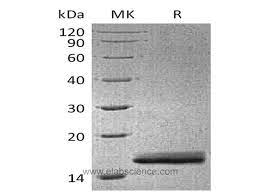AGR3 Protein Interaction
Using a proteomic approach to identify upregulated genes in breast cancer cell membranes, followed by database analysis and PCR of a breast carcinoma cell line, Adam et al. (2003) cloned BCMP11. The deduced 166 amino acid protein has an N-terminal signal sequence. Fluorescently labeled BCMP11 localized to secretory or endosome-like organelles in transfected breast carcinoma cell lines.
Immunohistochemical analysis showed that BCMP11 expression was restricted in normal tissues, with significant staining only of the epithelial mucosa of the colonic mucosa. However, BCMP11 was detected in 43 of 58 (74%) breast cancer tissues tested, but not in normal breast ductal epithelial cells. In cancerous epithelial cells, BCMP11 localizes to the cytoplasm.

Anterior gradient protein (AGR) 3 is a highly related homologue of the pro-oncogene AGR2 and belongs to the protein disulfide isomerase family. AGR3 has been found in breast, ovarian, prostate and liver cancers. It is associated with the level of differentiation, slow-proliferating tumors and a more favorable prognosis for patients with breast cancer.
AGR3 is a specialized member of the PDI family that plays an unexpected role in the regulation of CBF and mucociliary clearance in the airways. AGR3 has been characterized as a potential new biomarker for both breast cancer prognosis and early detection of breast cancer from blood.
